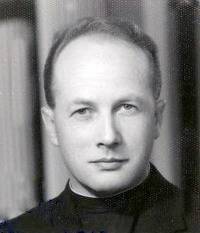| Collège Saint-Grégoire | Club Sportif de Jamhour | |
|

He was a distinguished figure of orientalism and a pioneer in the dialogue between Muslims and Christians, or rather between civilizations. He was a meticulous researcher and a very cultivated instructor. He opened the doors of knowledge to his students, wisely, patiently, with a great sense of analysis and synthesis. This university administrator knew how to combine wisdom with devotion.
Michel was born in
As soon as he finished
his first years of spiritual and literary education, he started learning Arabic
and its literature in 1946 in his order’s institute created to teach Arabic to
foreigners in
He wrote in Arabic a book entitled The Scientific Method and the Critical Spirit. In addition to these basic works, there are many scientific articles which were published in magazines specialized in theology, philosophy and orientalism, as well as in the magazine Travaux et Jours that he directed for a while.
Upon reading his books and articles, it is not difficult to notice the subjects that interested him. He studied Islam and its doctrines, old and modern Arab civilizations, trying to meet the other respectfully, loyally and faithfully. Hence, he was among the first to pave the way for the dialogue between civilizations and religions for he was convinced that the difference did not lead to discord but to the exchange of talents for a mutual enrichment.
His position in favor of the dialogue oriented his teaching activities and administrative work as well. When he was nominated President of the “Oriental Literature Institute” in 1963 – staying in office until his death – he developed this Institute as never before. Dozens of PhD candidates enrolled thanks to his good scientific reputation. At the end of 1975, some 800 PhD candidates registered in the Institute and he personally directed a great number of them, as if he were the elder brother. His knowledge, affection and devotion were obvious to all.
When the Lebanese war
started in 1975, he pursued his work relentlessly, in spite of the hurdles that
the bloody events and dangers set, impeding him from communicating with his
students. He used to go to Arab countries to meet them and advise them, sparing
them the dangers of the trip and saving their lives. On the night of January 15, 1976, upon returning
from
Father Allard died at 52 after having given so much. His boat took him and sailed away, where there was no limit to the West or the East, on the sea of immortality given to martyrs to faith, love and hope. The conversation that took place two weeks prior to his death between him and one of his Jesuit friends who became afterwards President of the Saint Joseph University in Beirut constitutes a good example of the martyrdom of Father Allard for the faith, love and hope. His friend said, “If Lebanon is demolished, part of our faith in bringing men together, i.e. the future, will fade away with it”. Father Allard lowered his head and replied, “This is exactly what I think, yet I have not lost hope”…